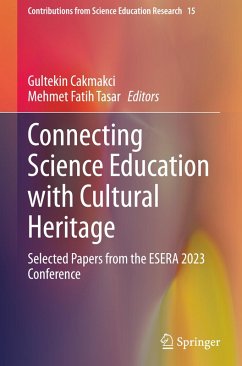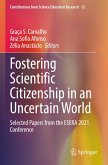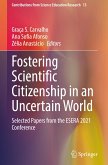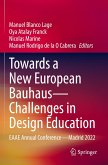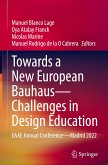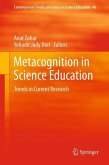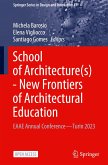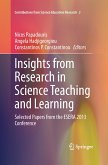Connecting Science Education with Cultural Heritage
Selected Papers from the ESERA 2023 Conference
Herausgegeben:Cakmakci, Gultekin; Tasar, Mehmet Fatih
Connecting Science Education with Cultural Heritage
Selected Papers from the ESERA 2023 Conference
Herausgegeben:Cakmakci, Gultekin; Tasar, Mehmet Fatih
- Gebundenes Buch
- Merkliste
- Auf die Merkliste
- Bewerten Bewerten
- Teilen
- Produkt teilen
- Produkterinnerung
- Produkterinnerung
This edited volume presents groundbreaking research in science education, focusing on the intersection of science and cultural heritage. Showcasing 23 high-quality studies, it draws from presentations at the 15th Biennial ESERA Conference held in Cappadocia, Türkiye, organized by Hacettepe University, Gazi University, and Nevsehir Haci Bektas Veli University.
Under the theme "Connecting Science Education with Cultural Heritage," the chapters offer fresh perspectives on advancing science education literature from diverse viewpoints. With contributions spanning continents, this book delivers…mehr
Andere Kunden interessierten sich auch für
![Fostering Scientific Citizenship in an Uncertain World Fostering Scientific Citizenship in an Uncertain World]() Fostering Scientific Citizenship in an Uncertain World121,99 €
Fostering Scientific Citizenship in an Uncertain World121,99 €![Fostering Scientific Citizenship in an Uncertain World Fostering Scientific Citizenship in an Uncertain World]() Fostering Scientific Citizenship in an Uncertain World121,99 €
Fostering Scientific Citizenship in an Uncertain World121,99 €![Towards a New European Bauhaus-Challenges in Design Education Towards a New European Bauhaus-Challenges in Design Education]() Towards a New European Bauhaus-Challenges in Design Education151,99 €
Towards a New European Bauhaus-Challenges in Design Education151,99 €![Towards a New European Bauhaus-Challenges in Design Education Towards a New European Bauhaus-Challenges in Design Education]() Towards a New European Bauhaus-Challenges in Design Education151,99 €
Towards a New European Bauhaus-Challenges in Design Education151,99 €![Metacognition in Science Education Metacognition in Science Education]() Metacognition in Science Education76,99 €
Metacognition in Science Education76,99 €![School of Architecture(s) - New Frontiers of Architectural Education School of Architecture(s) - New Frontiers of Architectural Education]() School of Architecture(s) - New Frontiers of Architectural Education38,99 €
School of Architecture(s) - New Frontiers of Architectural Education38,99 €![Insights from Research in Science Teaching and Learning Insights from Research in Science Teaching and Learning]() Insights from Research in Science Teaching and Learning76,99 €
Insights from Research in Science Teaching and Learning76,99 €-
-
-
This edited volume presents groundbreaking research in science education, focusing on the intersection of science and cultural heritage. Showcasing 23 high-quality studies, it draws from presentations at the 15th Biennial ESERA Conference held in Cappadocia, Türkiye, organized by Hacettepe University, Gazi University, and Nevsehir Haci Bektas Veli University.
Under the theme "Connecting Science Education with Cultural Heritage," the chapters offer fresh perspectives on advancing science education literature from diverse viewpoints. With contributions spanning continents, this book delivers an exceptional collection of international studies featuring original and rigorous methodologies. Scholars and researchers in science education will find this compilation an invaluable resource, making it a vital addition to academic libraries worldwide.
Under the theme "Connecting Science Education with Cultural Heritage," the chapters offer fresh perspectives on advancing science education literature from diverse viewpoints. With contributions spanning continents, this book delivers an exceptional collection of international studies featuring original and rigorous methodologies. Scholars and researchers in science education will find this compilation an invaluable resource, making it a vital addition to academic libraries worldwide.
Produktdetails
- Produktdetails
- Contributions from Science Education Research 15
- Verlag: Springer / Springer Nature Switzerland / Springer, Berlin
- Artikelnr. des Verlages: 978-3-031-90943-6
- Seitenzahl: 360
- Erscheinungstermin: 5. Juni 2025
- Englisch
- Abmessung: 241mm x 160mm x 25mm
- Gewicht: 703g
- ISBN-13: 9783031909436
- ISBN-10: 3031909437
- Artikelnr.: 73688085
- Herstellerkennzeichnung
- Springer-Verlag GmbH
- Tiergartenstr. 17
- 69121 Heidelberg
- ProductSafety@springernature.com
- Contributions from Science Education Research 15
- Verlag: Springer / Springer Nature Switzerland / Springer, Berlin
- Artikelnr. des Verlages: 978-3-031-90943-6
- Seitenzahl: 360
- Erscheinungstermin: 5. Juni 2025
- Englisch
- Abmessung: 241mm x 160mm x 25mm
- Gewicht: 703g
- ISBN-13: 9783031909436
- ISBN-10: 3031909437
- Artikelnr.: 73688085
- Herstellerkennzeichnung
- Springer-Verlag GmbH
- Tiergartenstr. 17
- 69121 Heidelberg
- ProductSafety@springernature.com
Gultekin Cakmakci is a Professor of Science Education and the Deputy Chairperson of the Research Coordination Board at Hacettepe University. He has been teaching courses on STEM education and public engagement with STEM since 2006. His research interests focus on developing scientific literacy among students and the general public and on designing, implementing, and evaluating STEM teaching. He is the founding editor of the Journal of Research in STEM Education. Mehmet Fatih Tasar is a Professor of Science Education at Gazi University, Türkiye, and Georgia State University, USA. He is the chief editor of The International Handbook of Physics Education Research published by American Institute of Physics Publishing. He is a co-editor for International Journal of Physics and Chemistry Education, Action Research and Innovation in Science Education, and Hellenic Journal of STEM Education.
Chapter 1. Introduction: Connecting Science Education with Cultural Heritage.- Section 1. Foundations and Emerging Trends in Science Education Research: Chapter 2. Misinformation in Science: The Response of Science Education.- Chapter 3. A Cognitive and Epistemic Account of the Nature of.- Chapter 4. How Has Science Education Research (SER) Evolved in The Last Two Decades?.- Chapter 5. Identity-Based Research in Science Education: Past, Present, and Possible Futures.- Chapter 6. Comparing Textual Data Analysis Methods in Science Education Research.- Section 2. Teaching, Learning, and Student Engagement in Science Education : Chapter 7. Just Play It Factors That Support Learning in Videos on Physics.- Chapter 8. Decoding Visual Attention: Eye-Tracking Insights into Students' Interaction with Images in Physics Textbooks.- Chapter 9. Applying Computational Thinking to Enhance Learning About Electricity A Norwegian Case Study.- Chapter 10. Students Multimodal Meaning Making of Nature of Science: From Isolated Scientific Practices to Coherent Scientific Methods.- Chapter 11. The S ence of Science Activities in Pre-School Science Education.- Chapter 12. Learning About Sound in Initial Teacher Training: Evaluation and Redesign of a Teaching-Learning Sequence.- Chapter 13. Acceptance of Evolution by Israeli Students from Diverse Religious Groups.- Chapter 14. Assessing Science Competencies in Danish Primary and Lower Secondary Education.- Section 3. Teacher Agency, Professional Development, and Leadership in Science Education: Chapter 15. Science Teachers Agentic Practice in the Pedagogy of Scientific Argumentation.- Chapter 16. Stages of the Professional Development of Mediators of Non-Formal Science Education Settings.- Chapter 17. Examining Teachers Perceptions of Authentic Science Practices and Practices-Based Curriculum.- Chapter 18. Representation of the Nature of Science in Exemplary Inquiry Teaching.- Chapter 19. Collaborative Network Literacy in Science Education Leadership: A Case Study of the Danish Academy of Science Education (NAFA).- Chapter 20. Gaijatra : Connecting Science Education with Cultural Heritage in a Professional Development Workshop in Nepal.- Chapter 21. What Does Educational Equity Mean? Views of the Harvard Teacher Fellows Program Members.- Section 4. Societal and Global Challenges in Science Education : Chapter 22. Exploring Narratives of Change for Imagining the Future and Fostering Agency toward Sustainability.- Chapter 23. The Voice of Policymakers, Professional Development Leaders, and Teachers Who Engage in Climate Change Education: A Cross-Country Comparison.
Chapter 1. Introduction: Connecting Science Education with Cultural Heritage.- Section 1. Foundations and Emerging Trends in Science Education Research: Chapter 2. Misinformation in Science: The Response of Science Education.- Chapter 3. A Cognitive and Epistemic Account of the Nature of.- Chapter 4. How Has Science Education Research (SER) Evolved in The Last Two Decades?.- Chapter 5. Identity-Based Research in Science Education: Past, Present, and Possible Futures.- Chapter 6. Comparing Textual Data Analysis Methods in Science Education Research.- Section 2. Teaching, Learning, and Student Engagement in Science Education : Chapter 7. Just Play It Factors That Support Learning in Videos on Physics.- Chapter 8. Decoding Visual Attention: Eye-Tracking Insights into Students' Interaction with Images in Physics Textbooks.- Chapter 9. Applying Computational Thinking to Enhance Learning About Electricity A Norwegian Case Study.- Chapter 10. Students Multimodal Meaning Making of Nature of Science: From Isolated Scientific Practices to Coherent Scientific Methods.- Chapter 11. The S ence of Science Activities in Pre-School Science Education.- Chapter 12. Learning About Sound in Initial Teacher Training: Evaluation and Redesign of a Teaching-Learning Sequence.- Chapter 13. Acceptance of Evolution by Israeli Students from Diverse Religious Groups.- Chapter 14. Assessing Science Competencies in Danish Primary and Lower Secondary Education.- Section 3. Teacher Agency, Professional Development, and Leadership in Science Education: Chapter 15. Science Teachers Agentic Practice in the Pedagogy of Scientific Argumentation.- Chapter 16. Stages of the Professional Development of Mediators of Non-Formal Science Education Settings.- Chapter 17. Examining Teachers Perceptions of Authentic Science Practices and Practices-Based Curriculum.- Chapter 18. Representation of the Nature of Science in Exemplary Inquiry Teaching.- Chapter 19. Collaborative Network Literacy in Science Education Leadership: A Case Study of the Danish Academy of Science Education (NAFA).- Chapter 20. Gaijatra : Connecting Science Education with Cultural Heritage in a Professional Development Workshop in Nepal.- Chapter 21. What Does Educational Equity Mean? Views of the Harvard Teacher Fellows Program Members.- Section 4. Societal and Global Challenges in Science Education : Chapter 22. Exploring Narratives of Change for Imagining the Future and Fostering Agency toward Sustainability.- Chapter 23. The Voice of Policymakers, Professional Development Leaders, and Teachers Who Engage in Climate Change Education: A Cross-Country Comparison.

